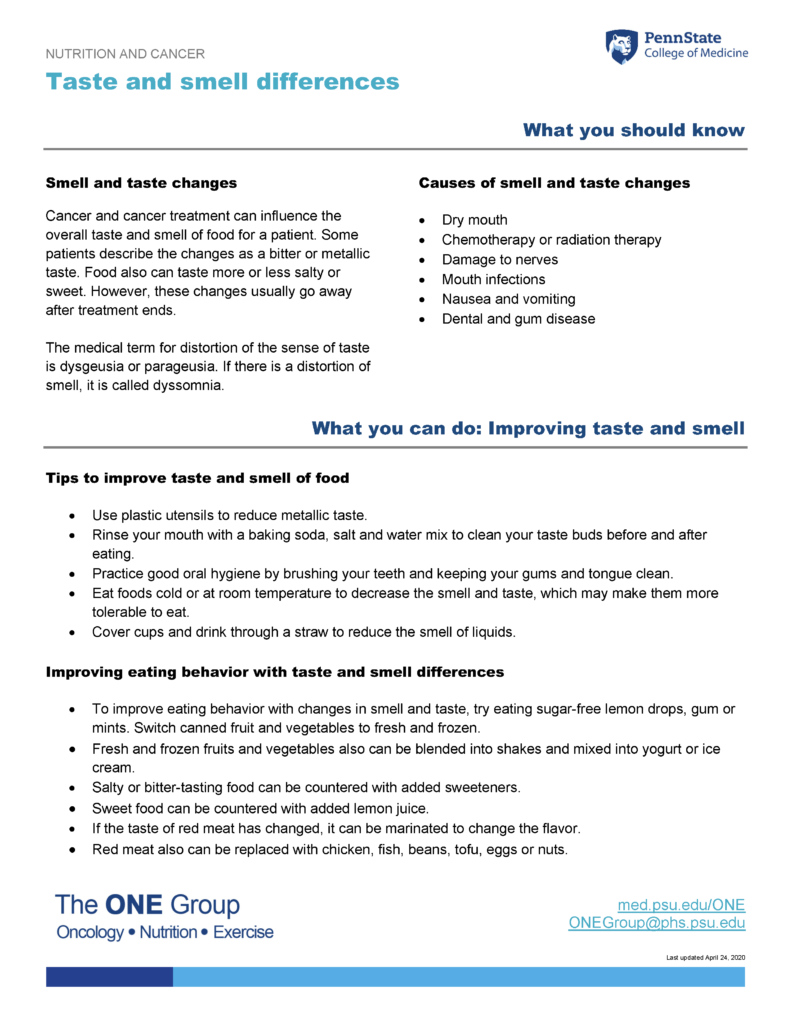Learn about taste and smell differences in people with cancer in this guide from The ONE Group (Oncology – Nutrition – Exercise) at Penn State College of Medicine.
Jump to topic
Search
What you should know
Smell and taste changes
Cancer and cancer treatment can influence the overall taste and smell of food for a patient.
Some patients describe the changes as a bitter or metallic taste. Food also can taste more or less salty or sweet.
However, these changes usually go away after treatment ends.
The medical term for distortion of the sense of taste is dysgeusia or parageusia. If there is a distortion of smell, it is called dyssomnia.
Causes of smell and taste changes
- Dry mouth
- Chemotherapy or radiation therapy
- Damage to nerves
- Mouth infections
- Nausea and vomiting
- Dental and gum disease
What you can do: Improving taste and smell
Tips to improve taste and smell of food
- Use plastic utensils to reduce metallic taste.
- Rinse your mouth with a baking soda, salt and water mix to clean your taste buds before and after eating.
- Practice good oral hygiene by brushing your teeth and keeping your gums and tongue clean.
- Eat foods cold or at room temperature to decrease the smell and taste, which may make them more tolerable to eat.
- Cover cups and drink through a straw to reduce the smell of liquids.
Improving eating behavior with taste and smell differences
- To improve eating behavior with changes in smell and taste, try eating sugar-free lemon drops, gum or mints. Switch canned fruit and vegetables to fresh and frozen.
- Fresh and frozen fruits and vegetables also can be blended into shakes and mixed into yogurt or ice cream.
- Salty or bitter-tasting food can be countered with added sweeteners.
- Sweet food can be countered with added lemon juice.
- If the taste of red meat has changed, it can be marinated to change the flavor.
- Red meat also can be replaced with chicken, fish, beans, tofu, eggs or nuts.
Foods to try
If you are more sensitive to the taste and smell of foods, try bread, crackers, oatmeal, young cheese, rice, pasta, mashed potatoes, egg, chicken and vegetables with a softer taste, like carrots or peas.
If you are less sensitive to the taste and smell of foods, try ice cream, milkshakes, smoothies, lemon wedges, lemonade, citrus fruits, vinegar and pickled food. You may also want to add spices like onion, garlic, chili powder, basil, oregano, rosemary or tarragon, and sauces like barbecue sauce, mustard or ketchup.
Foods to avoid
If your senses of taste and smell are more sensitive, avoid foods or drinks with a strong smell, like coffee or tea; try iced coffee or iced tea instead.
If foods have an iron-flavored taste and/or smell, avoid red meat, spinach, broccoli, nuts and canned foods.
Notes
References
- Academy of Nutrition and Dietetics
- American Cancer Society
- Canadian Cancer Society
- National Cancer Institute

